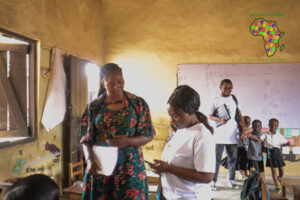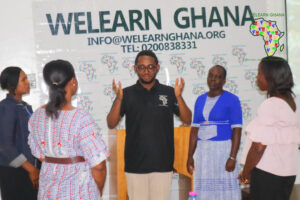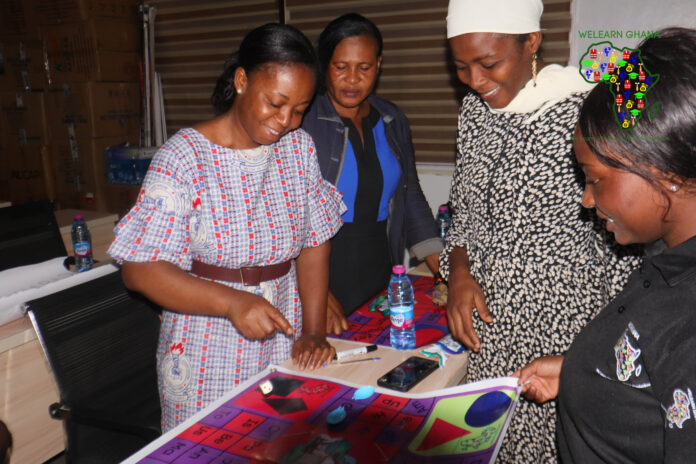In a groundbreaking initiative aimed at transforming early literacy education in Ghana, the “Bright Beginnings: Empowering Early Literacy in Ghanaian Communities” project, spearheaded by WeLearn Ghana with Better World Books as a key partner, has successfully concluded its first phase in the Oforikrom and Ejisu Municipal Assemblies.
The project, targeting children aged 2-5 years, is set to make a lasting impact on early childhood education in these rural communities.
Challenges
Early literacy is a critical foundation for lifelong learning, yet many communities in Ghana lack the necessary resources and support to foster this essential skill. The Oforikrom and Ejisu Municipal Assemblies are no exception. With limited access to libraries, digital resources, and structured literacy programs, children in these areas face significant barriers to developing their reading and writing abilities.
Recognizing these challenges, the Bright Beginnings project was launched by WeLearn Ghana to provide comprehensive support to local educators and parents. The initiative aims to enhance the quality of early literacy education through a combination of professional development, resource provision, and community engagement.
Better World Books has significantly contributed to the resources and materials available for the project.

Survey and Needs Assessment
The project began with an in-depth survey and needs assessment conducted across schools in the Oforikrom and Ejisu Municipal Assemblies.
Teachers participated in the survey, shedding light on the current state of early literacy education, the challenges faced, and their professional development needs.
The survey revealed a diverse range of teaching experiences and educational backgrounds among the teachers.
Most teachers expressed inadequate literacy activities in their daily lessons, they identified significant challenges such as lack of resources, insufficient training, and large class sizes.
The cumulative number of children taught by these teachers was over 500, highlighting the scale of impact that improved teaching practices could have.

Interactive Training Program
To address these challenges, an interactive training program was conducted for the teachers.
The session focused on key literacy strategies, including phonological awareness, vocabulary acquisition, and emergent reading. Teachers were actively engaged in designing and presenting literacy activities, fostering a collaborative learning environment.
The training program also included a group activity where teachers created and shared their own literacy activities.
This hands-on approach not only provided practical tools but also encouraged peer learning and support.
Additionally, interactive Teaching and learning materials and games were also distributed to the schools to enhance their early literacy training activities.
Feedback from the participants was overwhelmingly positive, with many expressing a renewed commitment to implementing the new strategies in their classrooms.
Workshop and Media Engagement
Building on the success of the initial training, a workshop for the next phase will be scheduled.
This workshop will delve deeper into literacy instruction techniques, classroom management, and the use of educational technology.
Additionally, a platform will be created to ensure and promote early literacy this will provide an avenue for teachers to share their experiences and challenges, fostering a community of practice. In parallel, the project will also engage the media to raise awareness about the challenges faced by rural educators and the impact of the Bright Beginnings initiative.
A media publication will highlight the teachers’ plight and the project’s efforts to address these challenges, aiming to garner further support and resources for the initiative.
A collaborative Effort
The Bright Beginnings project is a collaborative effort involving key stakeholders, including local schools, teachers, parents, and the wider community. The active participation of parents in providing feedback and support is crucial to the project’s success. By fostering a culture of literacy at home and in the community, the initiative aims to create a sustainable literacy ecosystem.
Moving Forward
The completion of the initial phase marks a significant milestone for the Bright Beginnings project. However, the journey to enhancing early literacy in the Oforikrom and Ejisu Municipal Assemblies is far from over. Continued support, training, and resource provision are essential to ensure that the positive momentum is sustained.
As the project moves forward, it remains committed to empowering educators, engaging parents, and fostering a love for reading and learning among young children.
The ultimate goal is to create a brighter future for the next generation, where every child has the opportunity to develop strong literacy skills and achieve their full potential.

